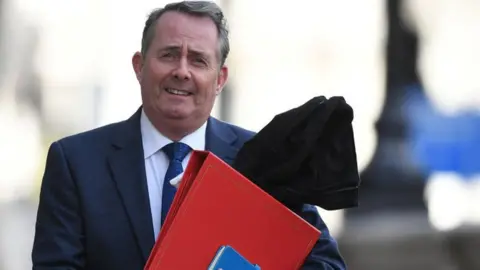Aid budget to be used by International Trade Department
 Getty Images
Getty ImagesThe Department for International Trade is to be given part of the official £14bn aid budget.
It will spend the funds on helping developing countries learn from UK expertise on trade deals and attracting foreign investment.
The move will see Liam Fox's department spending funds earmarked as Official Development Assistance.
The funds will still count towards the government's target of spending 0.7% of national income on overseas aid.
The measure was confirmed by Trade Secretary Liam Fox in an interview with BBC News.
"We want to bring development and trade closer together," he said.
"Rather than having developing countries dependent on the largesse of rich countries, we want them able to get sustainable development and trade their way out of poverty, and one of the ways in which we can do that is to give them the skills that will attract the investment into their country... to develop some of those attributes that helped us get investment into the UK and helps them get investment on a stable basis."
Labour accused the government of "pinching aid money from the world's poorest to prop up rich investors".
"As the government desperately chase post-Brexit trade deals, they must rule out raiding the aid budget for anything other than fighting global poverty," said Dan Carden, Labour's Shadow Secretary of State for International Development.
Moving the existing spread of aid spending away from the primary responsibility of the Department for International Development is already controversial.
More than a quarter of the budget is now spent by other departments, including the Foreign and Commonwealth Office, Home Office, Business Department, Heath Department and Revenue & Customs, up from a tenth just five years ago.
A National Audit Office report last month concluded: "Widening ODA expenditure to other departments has increased risks to effectiveness and it is not clear whether the intended benefits of drawing in wider skills have been realised."
'Tied aid'
Development charities have also been critical of a possible conflict of interest in tying aid spending on global poverty to the UK's post-Brexit trade agenda.
Last year, the Commons International Development Committee criticised existing programmes with such "dual objectives" for "being used as a slush fund to pay for developing the UK's diplomatic, trade or national security interests".
It criticised the Foreign Office's Prosperity Fund for giving aid money to projects to develop China's film industry, libraries and bond markets, and warned about steps "towards the return of tied aid".
The practice of channelling aid money at projects that also had to benefit British companies was banned by the Labour government in 2001.
Liam Fox told the BBC: "It is not tied aid in the sense it benefits the UK, it has to benefit the country itself. We know why countries invest in the UK - those reasons will hold for other countries as well.
"You have to remember that trade, free trade is the way we have taken a billion people out of abject poverty in a generation globally, one of the greatest achievements in our history. We need to make sure that carries on."
Countries targeted for this form of aid funding include Nigeria, South Africa, Kenya, Ethiopia, Colombia, Peru, Indonesia and Bangladesh, according to the Department for International Trade.
Many of these countries are not in the very poorest category of "Least Developed Country", but many are potential candidates for post-Brexit free trade agreements.
Reacting to the announcement, Dan Carden, Labour's shadow secretary of state for international development, said: "Pinching aid money from the world's poorest to prop up rich investors is a new low, even for the Tories.
"As the government desperately chase post-Brexit trade deals, they must rule out raiding the aid budget for anything other than fighting global poverty."
